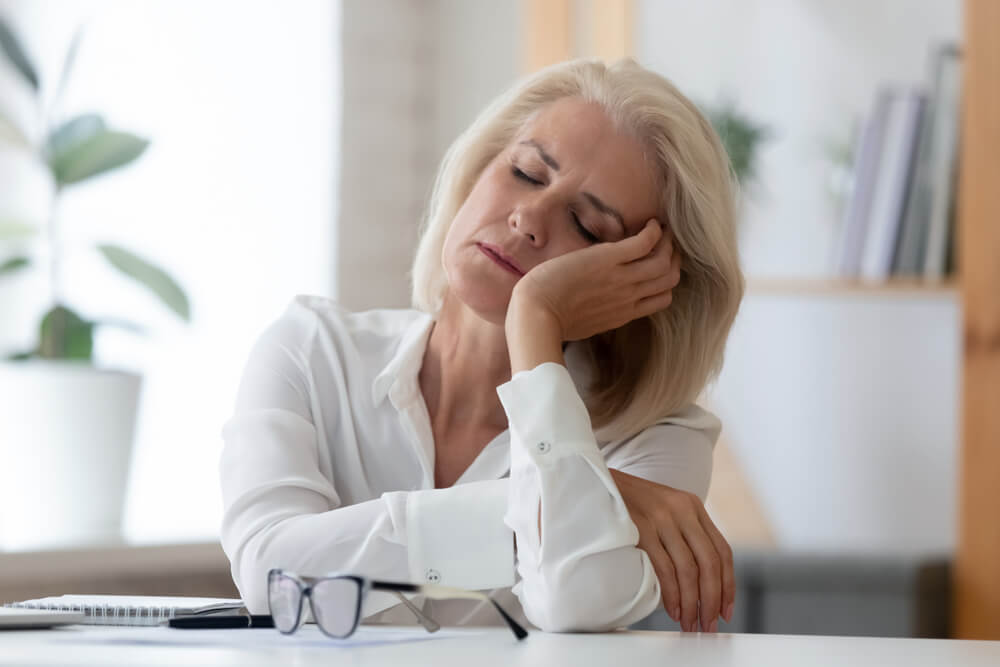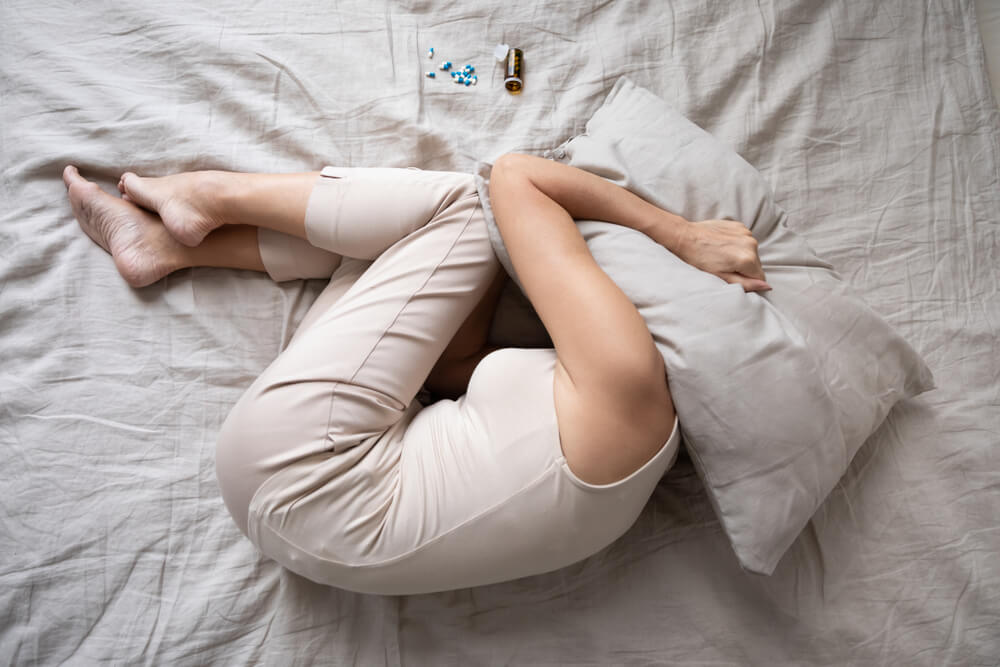Imagine trying to fall asleep while having a hot flash. Many women face sleep problems during menopause, and menopause fatigue itself triggers other symptoms. Maybe you are the type who falls asleep just fine but wakes up at 4 AM and can’t fall back asleep, even though you know you’ll be exhausted later. Or perhaps, you’re the type who struggles to fall asleep. Regardless, perimenopause and insomnia can have you tossing and turning all night, making the daytime less enjoyable.
We can all relate to the refreshed feeling of a good night’s sleep; that feeling is not a coincidence. Sleep is our body’s time to heal and repair itself. It is also a time when our minds get to reset. It is the most cost-effective and best beauty product. Lack of sleep also increases our cortisol levels and causes weight gain.
But most importantly, sleep problems during menopause are a symptom that can actually make other menopausal symptoms worse. Confusing, we know. Let us explain.
What Causes Menopause Fatigue
Sleep problems during menopause are caused by changing hormones. As you may know, during menopause, our hormones are all out of whack, making perimenopause and insomnia a real thing. You can help ease your symptoms by first understanding why you feel this way, then making lifestyle changes in order to get the perimenopause sleep you’re dreaming of.
Does Menopause Make You Tired?

Well, not exactly. However, our changing hormones during menopause cause a link between perimenopause and insomnia. When we don’t sleep properly, our body will produce two different types of hormones to regulate our energy and how we feel. The hunger hormones are ghrelin and leptin.
Our brains release ghrelin when we need to eat. Either we are actually in need of nutrients or our brain is playing a little trick on us. When we have low energy because of sleep deprivation, the brain releases ghrelin in hopes you’ll grab a snack. Your brain needs to get that energy to function properly.
On the other hand, our brains release leptin when we should stop eating. We should stop eating when we have enough energy and nutrients to function properly. Have you ever suddenly felt sluggish and filled up during a big meal? This is leptin doing its fine job to warn us to slow down, or we could face overload and a stomach ache.
Even if you are really good at balancing your diet, your body will go into survival mode while you sleep, causing you to jolt awake. Your body thinks it needs food even though you already have eaten a balanced day of meals. This is because of hormonal imbalance, and if we don’t do anything about it, it could only get worse.
Menopause Can’t Sleep
Still wondering, “Does menopause make you tired?” We all have an internal clock. Our bodies need sleep, but our hormones don’t always rest, making perimenopause and insomnia particularly frustrating.
We should produce melatonin during the evenings, making us sleep. In the morning, if our body produces cortisol at the right time, we feel alert and awake. If you wake up feeling fatigued or you have menopause but can’t sleep, your melatonin and cortisol levels may be out of the arrangement. You have to figure out a way to get the two back in sync to achieve a restful perimenopause sleep and wake cycle. You can start by trying to lower your cortisol levels in the evening. If you don’t have any idea how, keep reading to learn how to reset your circadian.
How to Improve Menopause Fatigue

- Go for a morning walk. Avoid reaching for your phone and scrolling through your Instagram feed when it’s time to wake up. Instead, slip on some comfy walking shoes and go outdoors. The morning light is fresh and filled with invigorating blue light, which helps our bodies produce a healthy amount of cortisol, allowing us to take on our day with lots of energy.Moving your body and getting enough exercise throughout the day can also help you unwind in the evening. Kickstart your healthier lifestyle with a 20-minute stroll each morning. Maybe create a destination for some added motivation. For example, walk to your favorite coffee or juice spot. Maybe get some friends to join you as well.
- No coffee after noon. Actually, once the clock strikes 12 in the afternoon, you’ll want to avoid all types of caffeine. Be careful to read labels, even on tea. Many processed foods contain caffeine, and sodas do too. It is normal and actually healthy to start to feel more tired as the day goes on. On the other hand, it is not regular to feel buzzy late in the afternoon; if we do, our cortisol is too high and maybe our caffeine intake as well.
The goal is to allow our sleep pressure to build up throughout the day, so when it is time to fall asleep, we feel tired.
- Unplug. About an hour or more before bedtime, switch your devices down and keep your hand off. Instead of filling our minds with stressful work emails or the latest vacation our college friend depicts on social media, reach for a book or maybe even wind down speaking with a family member. You also want to avoid TV shows. The blaring blue light causes our bodies to produce cortisol at the wrong time, wiring our brains to be alert and awake.
You should also switch your device to night mode either when you get home from work or around 7 P.M. Night mode will cast a yellowish haze over your devices to block blue light. After a few minutes, your eyes adjust, and you can’t notice much difference. You can also slip on a trendy pair of blue light glasses.
- Watch what you consume. Refined carbs spike your blood sugar. White bread, pastries, biscuits, and more will make your hormones wacky, causing you to wake up during your essential sleep. Also, alcohol leads to dehydration. Have you ever had a fun evening out and fell asleep right away only to be jolted awake mid-sleep, practically gasping for water?
As delicious as spaghetti, meatballs, and red wine may sound, the combination is awful if we want to achieve high-quality sleep. It comes down to what you decide is worth it. Also, maybe consider introducing a high-quality magnesium supplement into your diet. Magnesium helps our bodies relax. The mineral can also be found in some foods. Although, always consult with your doctor beforehand.
Get Professional Help
Sleep is one of the most important factors for all aspects of your health. If you feel sleep-deprived and these at-home tips are not helping, seek out medical care with us right away. At Women’s Care of Bradenton, we understand what you are going through. Your feminine health concerns and menopause fatigue are important to us. Call us today to book your appointment and experience better sleep soon.


